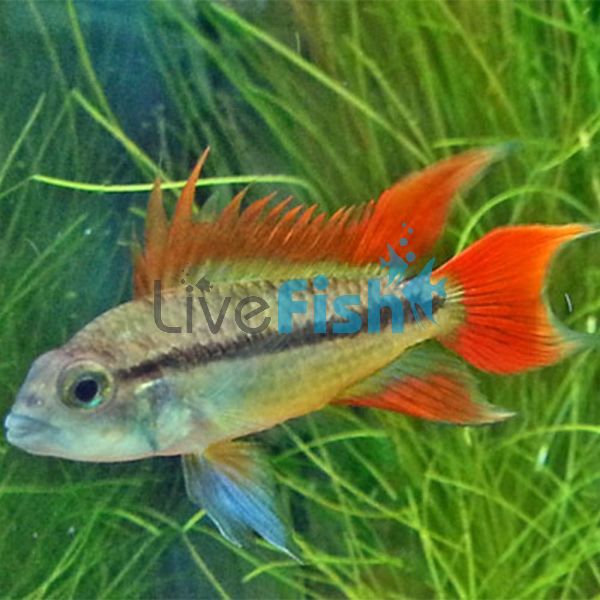Apistogramma Agassizii Double Red - Pairs 3.5cm
The Apistogramma Agassizii double red is like a version 2.0 of the standard Apistogramma agassizii. After selectively and meticulously breeding the standard agassizii this insanely colorful variation was created. The double red has double the number of colors with a bright orange body, mirror-like iridescent blue scales, and a bold black bar which leads to the most contrasting part of the fins being its fire-colored tail.
Apistogramma Agassizii Double Red
The Apistogramma Agassizii double red is like a version 2.0 of the standard Apistogramma agassizii. After selectively and meticulously breeding the standard agassizii this insanely colorful variation was created. The double red has double the number of colors with a bright orange body, mirror like iridescent blue scales, and a bold black bar which leads to the most contrasting part of the fins being its fire-colored tail. The fin age on this fish also sports the saturated orange look with a black outline. This fish would be a great long-term addition to a display community aquarium or a South American biotope and would be a real eye-catcher to look at. Trying to find the males and females in this species is possible where adult males have bolder colors and more bright blue scales whereas females have a yellower body. This form of Apistogramma is not an extremely shy species and will readily present its personality to its owners. Because of the fact they are tank bred and not wild-caught they adapt far easier to a change in aquarium conditions. The agassizii is also a species that is different from other Apistogramma species because of the reserved fin age it has. Though selectively bred and very colorful the fins are smaller and more natural-looking when compared to species like the cacatouidies, this can often appeal to people who want a more 'natural' looking fish. This dwarf cichlid would do best with other small community fish such as gouramis, tetras, and corydoras. naturally, the wild color Apistogramma agassizii habitat in South America.
Tank Recommendations for your Apistogramma Agassizii Double Red
The Apistogramma Double Red only needs a tank of around 20 gallons (75 liters) as they are a small growing fish, in fact they are considered to smaller than most other Apistogramma species. This makes them great for nano community aquariums or to just show off a breeding pair of Double Red. A sand substrate is advisable as these cichlids actively will sift through the sand looking for food. They will also appreciate hiding areas around small pieces of driftwood, rock caves and they will love a densely planted aquarium as well. This species is most active during the day when the lights are on during the day.
Suitable Tank Buddies
The Apistogramma Double Red is quite peaceful with aggression only ever coming out during breeding. With adequate space, these fish will get along with a wide range of community fish.
Usually Compatible
Tetras, gouramis, corydoras, angelfish, cherry barbs and common community fish species.
Sometime Compatible
Other Apistogramma species and dwarf cichlids such as rams and large peaceful cichlids such as Uaru or Severums might outcompete for food.
Rarely Compatible
Shrimp and large aggressive species such as African cichlids, Oscars, and Jaguar cichlids.
Feeding your Apistogramma Agassizii Double Red Cichlids
Being tank bred the double reds will easily consume aquarium foods. Naturally, they are carnivores and they will readily prefer meaty foods. They will consume a wide range of dry and frozen foods. Their diet should contain good quality sinking pellets or flake and be supplemented with frozen food that has high protein such as bloodworm, brine shrimp, and daphnia. Feeding should occur once a day and it is best to do so when the lights are on during the day
| Scientific Name | Apistogramma Agassizii |
|---|---|
| Care Level | Moderate |
| Common Names | Double red, Apistogramma double red |
| Diet | Carnivore |
| Fish Family | Cichlidae |
| Lifespan (years) | 10 |
| Max. Length (cm) | 7 |
| Min. Tank Volume (l) | 75 Litres |
| Origin | South America |
| Reef Safe | Yes |
| Sociability | Peaceful |
| Venomous | No |
| Water Conditions | 24-26° C (75-79° F), pH 5.0-7.0 |




